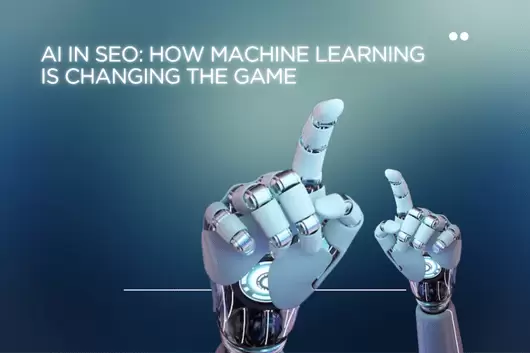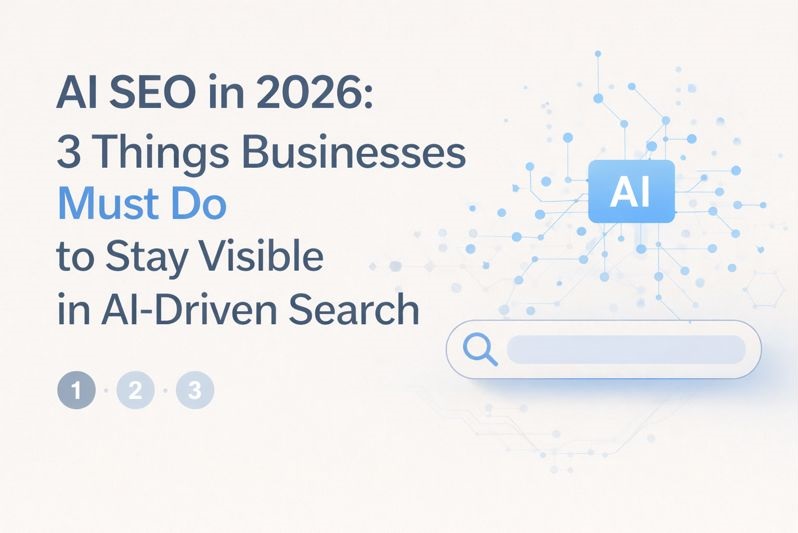Search Engine Optimization (SEO) has always been a critical part of digital marketing. With the rise of artificial intelligence (AI) and machine learning (ML), SEO is transforming rapidly. AI is revolutionising how businesses optimise their websites for search engines, making the process smarter, faster, and more accurate. In this blog, we’ll explore how AI impacts SEO and why it’s essential to understand these changes.
Understanding AI in SEO
AI refers to technology that can copy human intelligence, while machine learning is a subset of AI that allows systems to learn from data and improve over time. In SEO, AI helps automate many tasks that used to require manual effort, such as keyword research, content creation, and website optimization. The most popular example of AI in SEO is Google’s RankBrain, an AI algorithm that helps improve search results by understanding user intent.
AI’s ability to process large amounts of data allows businesses to optimise their strategies by understanding trends and user behaviour better. This improves the effectiveness of SEO campaigns, ultimately driving more traffic to websites.
The Role of Data Analysis in AI-Driven SEO
AI’s capacity to analyse massive datasets quickly gives it a significant advantage over traditional SEO tools. Machine learning algorithms can process data to find patterns and trends, making it easier to spot opportunities for optimization.
For example, AI tools can analyse user behaviour on your site, like time spent on pages, bounce rates, and click-through rates. With this analysis, AI systems can provide insights that help businesses understand what content works best, which pages need improvement, and what keywords to target.
Additionally, AI can help predict future trends by analysing past data. This allows marketers to create proactive keywords SEO strategies instead of reacting to changes after they happen. By predicting what users might be searching for in the future, businesses can create content that will rank high on search engines.
Popular AI Tools for SEO
Several AI-powered tools are available today that make SEO more efficient. Here are some popular ones:
- Surfer SEO: This tool uses AI to help with content optimization. It analyses the top-ranking pages for your keywords and gives you suggestions on how to improve your content.
- Frase: Frase is an AI-powered tool that helps you create SEO-friendly content. It can research keywords, analyse competitors, and even generate content outlines.
- Clearscope: This AI tool helps improve your content by suggesting related keywords and phrases based on top-performing articles in search results.
- RankBrain: Google’s own AI tool helps analyse user intent and adjust search results accordingly. Understanding how RankBrain works is crucial to staying ahead in SEO.
These tools use machine learning algorithms to improve their suggestions as they collect more data, making SEO tasks like content creation and keyword analysis much faster and more accurate.
How AI is Answering User Queries More Effectively
AI is changing how search engines understand user queries. In the past, search engines mainly focused on matching keywords to a query. Now, with AI, search engines like Google can understand the context and intent behind a search.
For example, if a user searches for “best smartphone for photography,” the AI can understand that the user is looking for smartphones with good camera features, even if the keywords don’t explicitly mention that. AI can also understand related terms, synonyms, and variations of phrases, making search results more relevant.
This shift toward understanding user intent has made content optimization more complex. It’s no longer enough to just stuff a page with keywords. SEO strategies must now focus on creating high-quality content that answers the specific needs of users.
How AI Can Boost Your SEO Strategy
AI doesn’t just make SEO easier; it also makes it more effective. Here are some ways AI can boost your SEO strategy:
- Better Keyword Research: AI tools can quickly analyse large amounts of data to find the most effective keywords for your business. By understanding what keywords your audience is searching for, you can create content that ranks higher in search results.
- Content Creation: AI can help generate content ideas, optimise existing content, and even write content. Tools like Jarvis.ai can write articles based on the topic and style you provide, saving time while still producing high-quality material.
- Personalization: AI can help create personalised experiences for your website visitors. By analysing user behaviour, AI can recommend specific products, blog posts, or services that are relevant to each visitor. This increases user engagement and helps reduce bounce rates.
- Voice Search Optimization: With the rise of voice assistants like Siri and Alexa, optimising for voice search is crucial. AI helps understand how users search differently when using voice commands, allowing you to optimise your content for this growing trend.
- Content and Technical Optimization: AI can analyse your website’s technical aspects, such as loading speeds, mobile-friendliness, and security. It can suggest ways to improve these areas, which can help boost your rankings on search engines.
The Role of AI in Website Optimization
AI tools can continuously monitor your website and suggest improvements for SEO. For instance, AI can track page loading times, find broken links, and even identify content that’s not performing well.
AI’s ability to analyse data in real time is particularly beneficial for keeping your website optimised. As Google changes its algorithm (which happens frequently), AI-powered tools can quickly analyse these changes and offer recommendations on how to adapt. This ensures your website stays in line with Google’s best practices and continues to rank well.
Can AI Replace Human SEO Experts?
While AI tools are making SEO much easier and more efficient, they aren’t a complete replacement for human experts. AI can handle data analysis, keyword research, and even content generation, but it lacks the creativity and strategic thinking that a human brings to the table.
SEO requires not only technical know-how but also a deep understanding of your audience and how they interact with your content. AI can assist in gathering insights and automating tasks, but human SEO experts are still needed to interpret the data and create a comprehensive strategy.
Conclusion
AI and machine learning are transforming SEO, making it faster, smarter, and more efficient. From data analysis to content creation, AI tools offer a range of solutions that help businesses improve their SEO strategies. Understanding how AI works in SEO is critical for staying ahead in a competitive digital world. While AI can handle many of the technical aspects of SEO, the human touch is still necessary for creating engaging, high-quality content that resonates with your audience.
By leveraging AI tools effectively, you can optimise your website, boost your rankings, and ultimately attract more traffic. It’s clear that the future of SEO is intertwined with AI, and businesses that adopt these tools will be better positioned to succeed in the ever-evolving digital landscape. SEO agencies in Thane are already taking advantage of these advancements to help local businesses thrive in the competitive online market.







